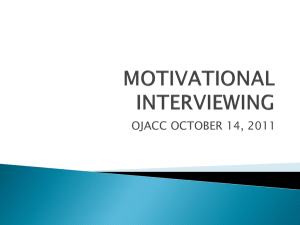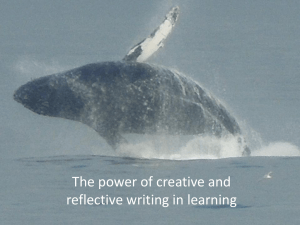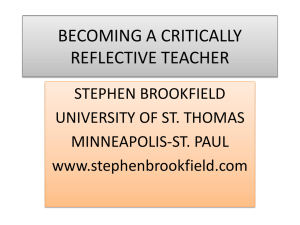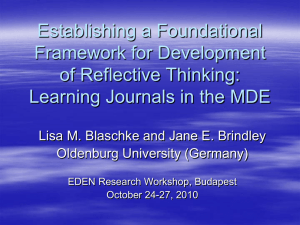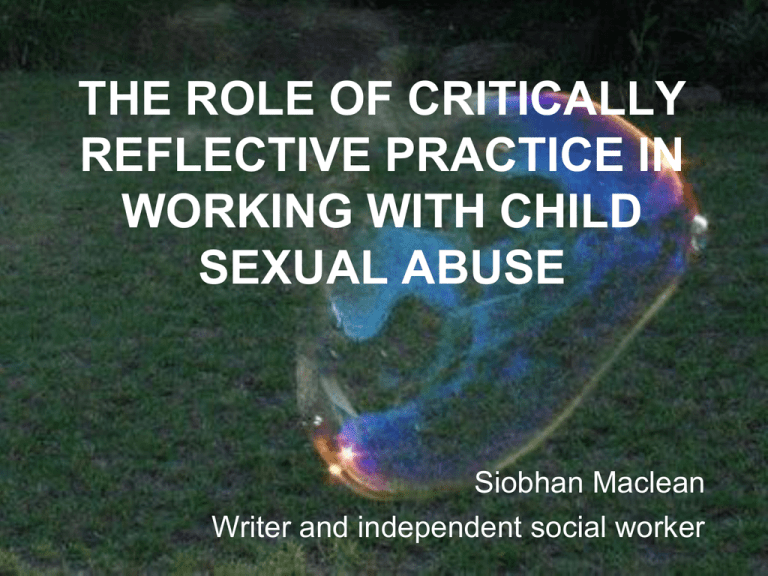
THE ROLE OF CRITICALLY
REFLECTIVE PRACTICE IN
WORKING WITH CHILD
SEXUAL ABUSE
Siobhan Maclean
Writer and independent social worker
Reflective practice / critical
reflection : what is it?
• Process of review to inform learning (eg:
Schon, Reid etc)
• Active, persistent and careful
consideration of any belief or supposed
form of knowledge (Dewey 1933)
• Mental process of trying to
restructure existing
knowledge and insights
(Korthagen 2001)
Critically reflective practice:
key components
Rethinking / deconstructing power
Awareness of values and implications
for practice
Exploring emotions / emotional intelligence
Drawing on knowledge / developing knowledge
and practice wisdom
Self awareness
Creating uncertainty through dynamic
questioning – willingness to live with
that uncertainty
3
Child Sexual Abuse:
key issues
Power and powerlessness
Changing societal values
Emotional impact / distress
Developing / emerging knowledge
Impact of personal experiences /
values (self awareness)
More questions than answers
(uncertainty)
4
5
POWER
VALUES
EMOTIONS
KNOWLEDGE
SELF AWARENESS
UNCERTAINTY
6
Reflective Practice: Power
• Fook – critically reflective practice
• Deconstruction of ‘realities’ with a focus
on power dynamics
Reflective Practice: Self Awareness
Personal process relies on personal
awareness
Distress and emotions
Reflection and self awareness are key aspects of
emotional intelligence – “keeping distress from
swamping the ability to think, to empathise and to
hope” (Goleman 1996)
Drawing on Knowledge
Knowledge is fixed and creates limitations to
the way that we see things……
Knowledge is time, context and societally
and culturally specific..
10
Freud’s Seminar ‘The Ateology of Hysteria’ (1896)
“Almost all of my women patients told me that they had
been seduced by their father. I was driven to recognize
in the end that these reports were untrue and so came
to understand that the hysterical symptoms are derived
from phantasies and not from real occurrences……
It was only later that I was able to recognize
in this phantasy of being seduced by
the father the expression of the typical
Oedipus complex in women.”
(Sigmund Freud 1933)
11
Reflective processes can potentially unearth
any assumptions about anything…. Some
crucial but hitherto deeply hidden
assumptions may be uncovered.
(Fook 2004: 59)
12
The earth was flat……….
Child sexual
abuse didn’t
happen….
Sula Wolff
(1973)
Seminal text
No mention of
child sexual
abuse
10 years on…..
Judith Herman
“This distributing fact….
Has been repeatedly
unearthed in the past
hundred years, and just
as repeatedly buried…..
The information was
simply too threatening to
be maintained in public
consciousness.”
(1982:7)
15
• Women don’t abuse…
• Where they do they have been coerced or
controlled by men….
Critically reflective practice recognises that
there is no truth and that we
need to be open to all
possibilities…..
An ability to “imagine” or think
beyond knowledge
17
Difficulties / barriers
Time constraints
Striving for certainty
Evidence based practice
Reflective practice can be painful and create
a crisis of confidence
Organisational constraints
Lack of reflective supervision
Lack of clarity about reflective
practice
Dangers in Reflection
• Reflecting into a void and seeing only
what we want, can take or believe....
19
Reflexive
spaghetti
Burnham (1993)
Reflecting on reflections
about reflections….
Ties us up and prevents
action
Characteristics of a reflective
practitioner (Brookfield 1998)
• Assumption analysis : challenging our own
beliefs and values
• Contextual awareness : recognition of social
construction of beliefs and practice
• Imaginative speculation: ability to imagine a
different way
• Reflective Scepticism: Challenging
or suspending existing knowledge
and beliefs
So what can be done?
(Individual level)
Find a model of reflective practice which you
are comfortable with – this will vary for each
practitioner
Seek out “critical friends”
Develop awareness of what is impacting on
reflections
Don’t avoid the questions – but
likewise don’t delay actions
So what can be done?
(Organisational / societal level)
Critically reflective organisations (Munro)
Challenging power
Educate children and young
people to critically reflect
23
Siobhan Maclean
Kirwin Maclean Associates
enquiries@kirwinmaclean.com



